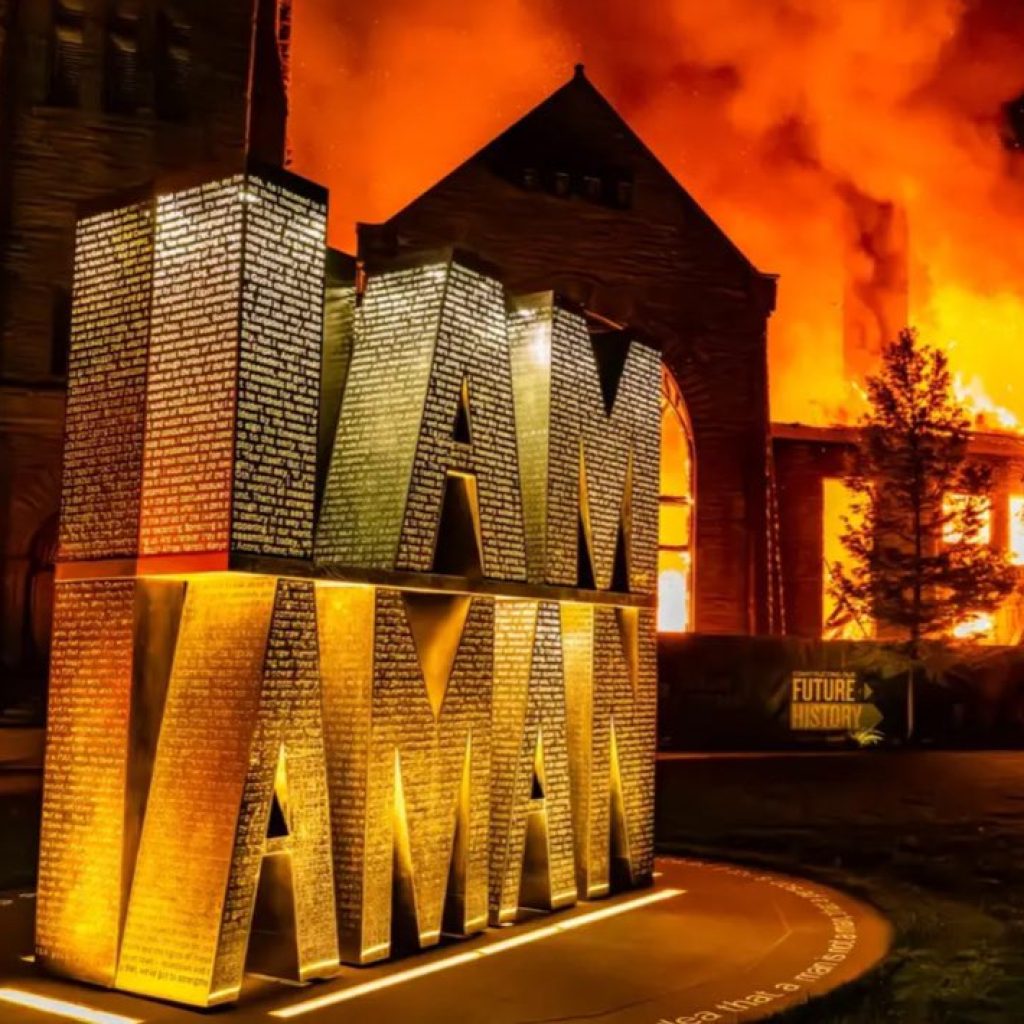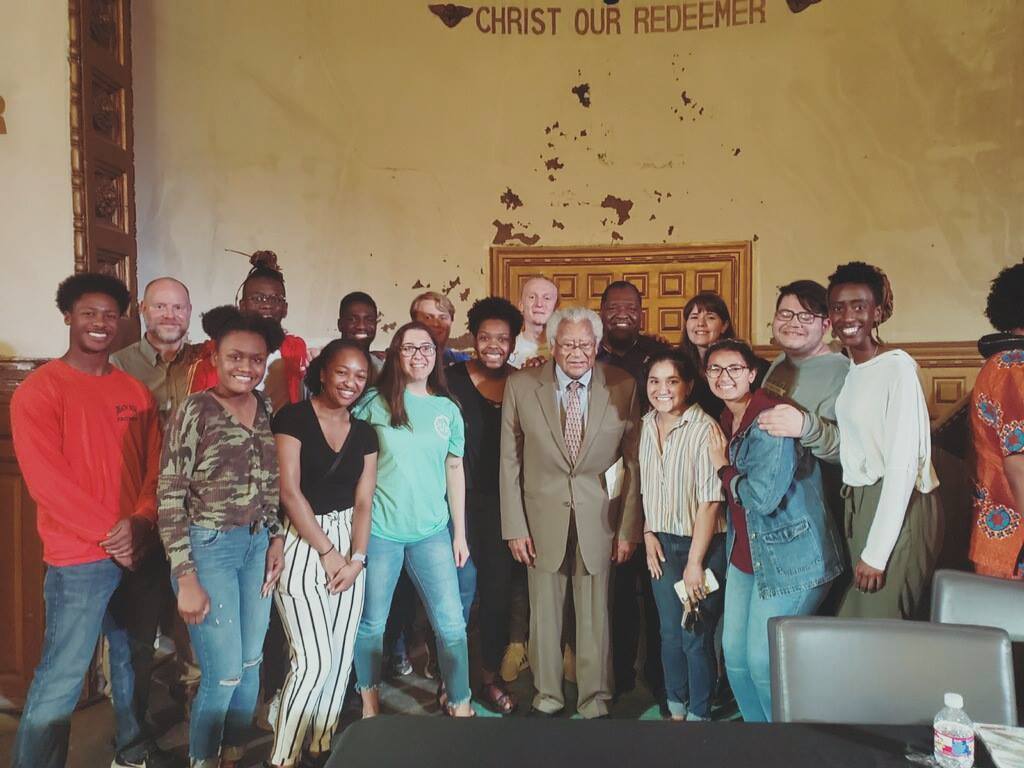An open letter from our Executive Director, Tryce Prince, reflecting on the practice of collective remembrance, how it shapes our own work, and what it means for our new initiative: #WhyWeRemember
Collective remembrance is a central practice of what we do at the Carl Spain Center. And often, this practice takes us to sacred places like the Historic Clayborn Temple. These places are more than relics of the past, they are community heirlooms that testify of an ongoing and prophetic Christian witness. This spring, Clayborn Temple hosted the 8th installment of their In This Place series, where attendees remembered the testimony of their own community heirloom. They also gathered to imagine their collective future. This year’s theme, “Imagine Memphis,” was an opportunity for their community “to come together and reimagine who we could be as a community,” Anasa Torutman, Executive Director of Historic Clayborn Temple, said.
But now, much of the Historic Clayborn Temple sits in ash and fire-consumed rubble, consequences of an act of arson twelve days after the conclusion of the annual In This Place event series. The Carl Spain Center laments the loss of such a sacred place. We mourn with all of the staff, workers, organizers, and community members (past and present) who worked to maintain the memory of Clayborn Temple, restore its glory, and reimagine their sacred place in the 21st century.

In 2019, the Carl Spain Center was directly blessed by Clayborn’s restoration effort. That April, we sponsored the King in Context colloquium. With 14 ACU undergraduate students, we traveled to Memphis, Tennessee. There, we analyzed Rev. Dr. Martin Luther King Jr’s work, in the city where he gave his final speech. And God moved on our behalf. In the National Civil Rights Museum at the Lorraine Motel, the site of King’s murder, we heard news that changed the trajectory of our trip: Rev. James Lawson Jr. was speaking at Clayborn Temple later that day. A man whose life was quite literally inscribed on the walls of the museum we were visiting was getting set to speak five minutes down the street.
That night, we had the honor of attending the final installment of the historic Clayborn Temple’s 2019 In This Place series. While there, our students were given the opportunity to meet Rev. Lawson (I proudly snapped the photo below), and heard him discuss what local communities can do to ensure a bright future for all people across race, class, and location. As he reminisced on his work during the Black Freedom Struggle, he also lamented. He lamented because there was another layer of the movement of MLK, Fannie Lou Hamer, Rosa Parks, Jo Ann Robinson and the rest of the nonviolent struggle that he believed must be restored: “We weren’t just working for civil rights,” he said, “we were working for the manifestation of the Kingdom of God on earth. We had a care for all of our neighbors, even when that neighbor was a hostile enemy.”

Rev. Lawson’s words encapsulate the mission and vision of the Carl Spain Center. The work we do is sacred. We strive for racial unity because we follow the boundary-defying model of Jesus, who reached across all social boundaries to inaugurate a world marked by unity, not division. As co-heirs with Christ, we too seek this new-world. We remember the life and teachings of Jesus, and we remember the work of prophetic Christians like Rev. James Lawson and our own namesake— Carl Spain— who serve as models for the imaginative witness we seek to model today.
In the face of the fires of destruction like those we witnessed in Memphis, in addition to the social wildfires of our time, it is natural to be burdened by the weight of despair. When we see evil, we are reminded that sin plagues our world. This should move us to lament. It should also move us to remember why our lives as people of God must be marked by love and fellowship with others. As Jesus makes clear, our greatest command as those who love God is to love our neighbors. It is fitting, as we see in Romans 15, that the call to love our neighbor by bearing their burdens and living in harmony with them is accompanied by a call to remember. Namely, the word of God, so that “through endurance and through the encouragement of the Scriptures we might have hope.” Though the fires of evil rage, be encouraged: they will not consume us. Hope still lives. Therefore, we should live like people who have hope.
Just as Rev. Lawson’s act of remembrance set the record straight on the sacred work of the Black Freedom Struggle, we have an opportunity to set the record straight in our own time. The Carl Spain Center practices collective remembrance because we believe it has the power to help us resist the temptation of despair. But we also believe collective remembrance can resist another temptation: social amnesia. When we practice remembrance, we are carrying forward testimonies of triumph, but also tragedy. Yes, we remember that our past speaks to our great potential, but we must also recognize that our past illuminates some of our worst tendencies. Rather than run from facing our dark past, however, we can choose to face it because we know we have the power of God in us to overcome it— we know a new-world is possible.
This week, many have collectively remembered the cost of three themes of which Dr. King often spoke of: racism, war, and poverty. Many gathered to remember lives lost in military service. Many also gathered to remember the life of George Floyd, whose killing in Minneapolis five years ago initiated a wave of collective remembrance that still ripples. And today, the Historic Clayborn Temple will gather to remember the loss of a community pillar that was rising again to meet the needs of its people.
These collective acts of remembrance evoke for us a question: How will we remember the history that continues to shape our present? Will we practice collective remembrance, or social amnesia? Will we choose to face only our triumphs, or will we dare to learn from past tragedies? At the Carl Spain Center, we choose to practice collective remembrance with an understanding that we as a people are shaped by all of our past. And therefore, to fully know ourselves, we must simultaneously look back at our history and practice collective remembrance as we move forward together.
Why Do You Remember?
To continue our practice of collective remembrance, we have created a new initiative called #WhyWeRemember:
Our strategy: We invite you to answer the question: why do you remember? In this answer, we ask that you 1) reflect on your experience you’ve had with the Carl Spain Center or your personal examination of race and racism, 2) tell us how you are remembering collective histories of race and racism, 3) testify why this practice of remembrance is important to you, 4) share how you are continuing to pursue racial unity or address race and racism in your local community, and 5) tell us how we can support you!
Our method: Share your testimony of remembrance using the hashtag #WhyWeRemember, and share your testimony directly here.
In a moment marked by destruction and despair, #WhyWeRemember seeks to model the practice of collective remembrance in an effort to remind ourselves and our neighbors that a new-world is possible.
